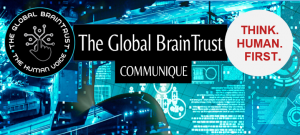
The Need for Diversity in AI’s Trajectory is Critical for Safe Human-Centred Adoption, says the AI Global BrainTrust.
Professor Brie Alexander, Cultural Advisor to the African Diaspora at The Global Braintrust Offers Deeper Dive Insights
SEATTLE, WA, UNITED STATES, December 6, 2024 /EINPresswire.com/ -- Diversity in the development and application of artificial intelligence (AI), diversity is not just desirable, it is a critical necessity that needs to be addressed at the highest levels of decision-making, according to the Global BrainTrust, an advocacy group for the ethical, secure and human centred adoption of AI.
AI is a powerful tool, that must be shaped by, and account for, the diversity of nationalities, socio-economic backgrounds, and religions, to make it is truly representational and equitable in its progression, said Sana Bagersh, the Founder of The Global BrainTrust. "We believe at the Global BrainTrust that a human-centric approach to A's adoption is possible, and that it can only be achieved through the collaborative involvement of the broadest segments of humanity", she added.
"Diversity is essential to ensure that AI systems are developed and deployed in a manner that can mitigate biases, identify potential blind spots, and create solutions that benefit everyone. We must harness the collective wisdom of humanity to guide the development of AI so it is always a force for good, and we must institute the necessary guardrails so it never becomes a tool for division or harm."
Based in Ivory Coast, Brie Alexander, The Global BrainTrust's Cultural Advisor to the African Diaspora, offered a deeper dive perspective on the issue.
AI technology influences every aspect of modern life, from economic systems to personal privacy. However, a lack of diversity among AI decision-makers risks creating technologies that reinforce biases, overlook the needs of marginalized communities, and uphold the status quo of inequity, she said, adding that people who identify as white represent only 16% of the global population, with white men comprising approximately half of that figure. Yet it is this small minority which largely influences technology, with far-reaching impact on billions of people worldwide.
"When a narrow demographic holds power over the development of AI, the resulting technologies often fail to represent the experiences and needs of the broader global population. AI systems are shaped by the data they are trained on and the people who create them," she said. "When teams lack representation across different races, genders, and socio-economic backgrounds, the technologies they produce can reflect a narrow worldview, unintentionally perpetuating existing biases and negatively impacting marginalized communities. For instance, facial recognition technologies have been shown to misidentify people of color at disproportionately high rates, underscoring the need for a more inclusive approach to AI development."
Alexander explained that compounding this issue is the often hostile work environment faced by women and people of colour in tech hubs such as Silicon Valley. "Many endure discrimination, microaggressions, and limited access to leadership roles. In many cases, the same tech leaders who resist diversifying leadership roles perpetuate a culture of exclusivity that makes the field increasingly inaccessible to diverse voices. When the leaders building and deploying AI are indifferent to diversity, equity, and inclusion (DEI), it becomes nearly impossible to address the biases embedded in these systems."
Compounding these challenges is the industry’s inconsistent stance on DEI which has been shifting with political climates, she said, alluding to Boeing’s recent decision to dismantle its DEI program while advancing partnerships that explore AI and military tech integration, and to Meta’s appointment of an all-white, all-male advisory council.
"Both moves underscore a trend where DEI initiatives are deprioritized, symbolic, or dismissed altogether when inconvenient, despite clear evidence that diverse teams yield stronger, more innovative solutions. This shortsightedness reveals a troubling reality: DEI efforts in tech are too often tokenized, prioritized only when politically convenient rather than integral to company values and innovation strategies. This dismissive approach overlooks the strategic advantage of diverse perspectives and denies the global population the chance to benefit from fair, ethical, and widely beneficial AI systems," she said.
If AI is to serve the broader needs of humanity, we must champion diversity within its leadership, said Alexander. True change means empowering people from all backgrounds—particularly women and people of color—not only to participate in AI’s development but to shape its direction, design, and governance. "It is only by fostering inclusive leadership at every level that we have the potential to create an AI landscape that embodies innovation and serves as a force for equity, advancing a fairer, more just society."
Bagersh added that a real shift will only happen when diversity, equity, and inclusion are treated as essential values embedded within the very core of AI’s development rather than treated as optional or dictated by shifting political winds. "The future of AI must be shaped by a chorus of diverse voices that represent the full spectrum of human experience. Only then can AI progress in a way that reflects the world it serves—safely, equitably and inclusively."
The Global BrainTrust is a grassroots advocacy platform, launched in Silicon Valley, that attempts to broaden the conversation beyond tech's corridors, to the wider world. The Global BrainTrust brings together a diverse range of civil society stakeholders from different nations, that include technologists, teachers, students, business professionals, practitioners, policymakers, experts, artists, designers and community groups. The intention is for this diverse assembly of voices to present the views and concerns affecting 'humanity' as a whole.
Sana Bagersh
BrandMoxie
+1 206-488-8018
email us here
Visit us on social media:
LinkedIn
Distribution channels: Business & Economy, Culture, Society & Lifestyle, Politics, Technology, World & Regional
Legal Disclaimer:
EIN Presswire provides this news content "as is" without warranty of any kind. We do not accept any responsibility or liability for the accuracy, content, images, videos, licenses, completeness, legality, or reliability of the information contained in this article. If you have any complaints or copyright issues related to this article, kindly contact the author above.
Submit your press release
